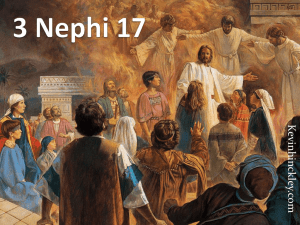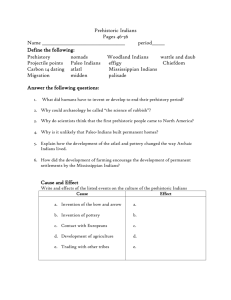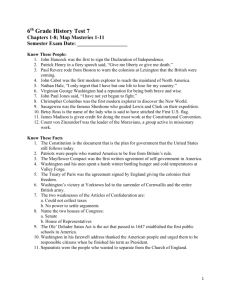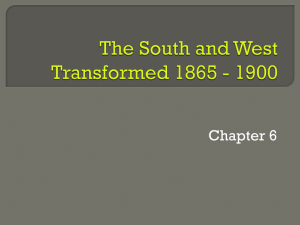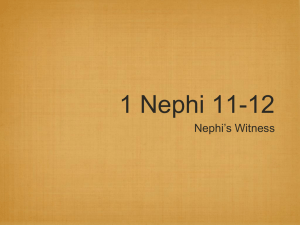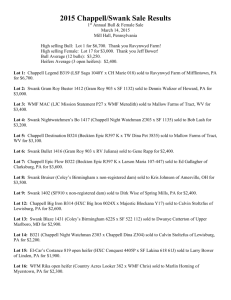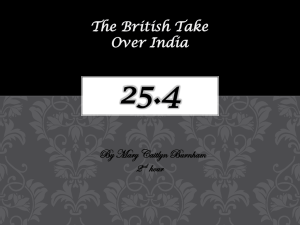history of james brigham wright and sarah jane chappell
advertisement
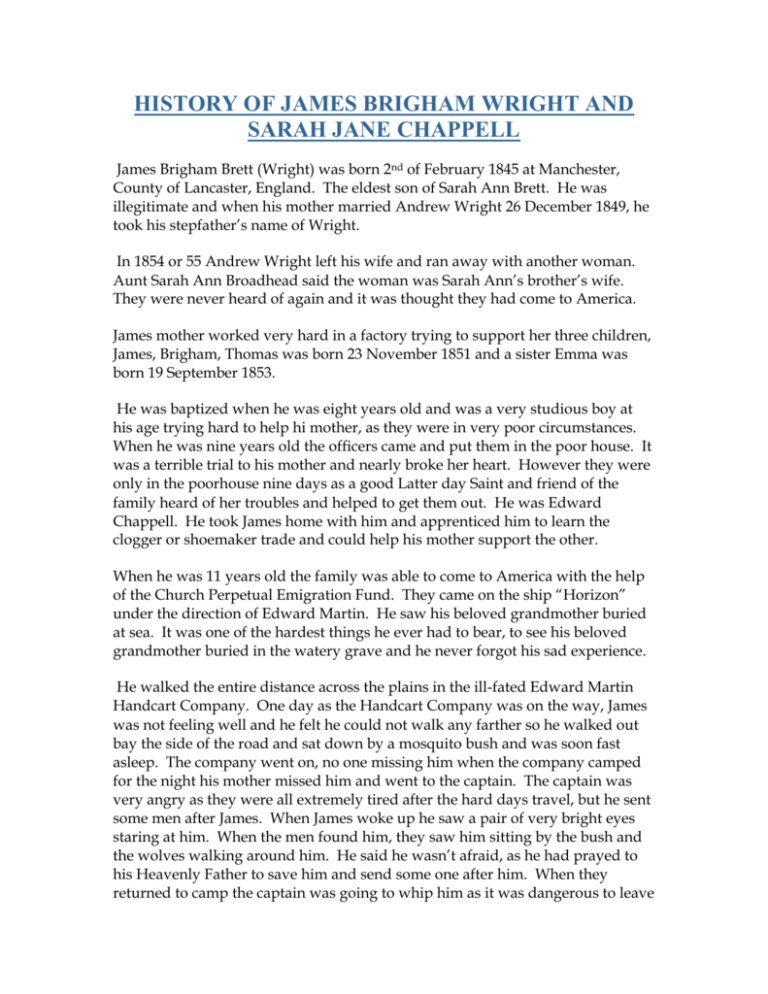
HISTORY OF JAMES BRIGHAM WRIGHT AND SARAH JANE CHAPPELL James Brigham Brett (Wright) was born 2nd of February 1845 at Manchester, County of Lancaster, England. The eldest son of Sarah Ann Brett. He was illegitimate and when his mother married Andrew Wright 26 December 1849, he took his stepfather’s name of Wright. In 1854 or 55 Andrew Wright left his wife and ran away with another woman. Aunt Sarah Ann Broadhead said the woman was Sarah Ann’s brother’s wife. They were never heard of again and it was thought they had come to America. James mother worked very hard in a factory trying to support her three children, James, Brigham, Thomas was born 23 November 1851 and a sister Emma was born 19 September 1853. He was baptized when he was eight years old and was a very studious boy at his age trying hard to help hi mother, as they were in very poor circumstances. When he was nine years old the officers came and put them in the poor house. It was a terrible trial to his mother and nearly broke her heart. However they were only in the poorhouse nine days as a good Latter day Saint and friend of the family heard of her troubles and helped to get them out. He was Edward Chappell. He took James home with him and apprenticed him to learn the clogger or shoemaker trade and could help his mother support the other. When he was 11 years old the family was able to come to America with the help of the Church Perpetual Emigration Fund. They came on the ship “Horizon” under the direction of Edward Martin. He saw his beloved grandmother buried at sea. It was one of the hardest things he ever had to bear, to see his beloved grandmother buried in the watery grave and he never forgot his sad experience. He walked the entire distance across the plains in the ill-fated Edward Martin Handcart Company. One day as the Handcart Company was on the way, James was not feeling well and he felt he could not walk any farther so he walked out bay the side of the road and sat down by a mosquito bush and was soon fast asleep. The company went on, no one missing him when the company camped for the night his mother missed him and went to the captain. The captain was very angry as they were all extremely tired after the hard days travel, but he sent some men after James. When James woke up he saw a pair of very bright eyes staring at him. When the men found him, they saw him sitting by the bush and the wolves walking around him. He said he wasn’t afraid, as he had prayed to his Heavenly Father to save him and send some one after him. When they returned to camp the captain was going to whip him as it was dangerous to leave the company and he had caused a lot of trouble for all were so weary. But his mother said, “No, you are not going to whip him as he is sick.” Another time James said the best meal he ever ate or the one that tasted the best was as the company was traveling, some cattle or oxen would give out and could not go any further so they would kill them for beef. One day they were on a little creek and took the animal down to the water to clean it. After it was all over, James and a few other boys went down where they had butchered the oxen, and got the entrails of the animal, cut in small pieces about 6 inches long, turned them inside out and washed them clean in the creak then cooked them over a fire. The Captain was exceedingly angry with them as the boys could have killed themselves they were so hungry, for they were extremely short of food and had been rationed down to one quarter of a pound of meal a day for cakes or hotcakes and they were like small pancakes. James said he would never forget how hungry they were most of the time. One time his mother caught him chewing buffalo hoofs that he had found on the trail. He said one of the greatest temptations he ever had was one morning while all the children were in bed and his mother and another women were cooking breakfast, which consisted of one small pancake a piece made from flour and water, his mother put the pancakes on a platter inside of the tent in which he was sleeping. He woke up and saw these cakes. The other children were still sleeping and his mother was out of the tent so got up and took one of the cakes and ate it under the covers. When his mother counted the cakes and found one was gone she asked James if he had taken it. He said, “Yea, Mother, I was so hungry.” She broke down and cried and said, “I know my boys, I know, we are all hungry”. It was the first time he ever saw his mother cry. Many of the Saints came down with the chills and fever and were dying from exposure. One day James became sick and his mother could see that he was getting the chills and fever. She got a little stick and began to run him around the campfire until he was perspiring freely then she rolled him in a blanket and he was well the next day. He said she saved his life through her quick thinking. He used to help his mother gather buffalo chips to build fires when there was no wood available. Many times he helped shovel snow at night to make their beds, and he helped pull the handcart. More detail about the trip across the plains is found in his mother’s history. After they arrived in Salt Lake and rested for a few days they went on to Payson and made their home. Their suffering and trials were not over for food was scarce and the grasshoppers had been bad that summer in the valley. They lived on roots and weeds and never tasted bread for six weeks. The first bread was made out of bran and it was so good. His mother married Thomas Corbett and when he died they moved to Nephi. There she married Samuel Phillips and they had a small farm and James helped with the work and grew up in Nephi. When he was nearly 19 years old he was called by Brigham Young to return with ox teams to Winter Quarters, he found the Edward Chappell family waiting there to come across the plains. He asked and was granted permission for this Chappell family to ride in his wagon. This was a happy meeting as they were old friends in England, who he had worked for. Edward Chappell was born 23 August 1822 in Manchester and his wife, Agnes Boardman was born 15 March 1824. He and his wife joined the church in the early days. He was baptized 27 August 1848 and Agnes was baptized a few days before on the 8th of August. They were the only ones in each of their families to join. They lived in Manchester the greater part of their lives. There was a small branch of the Church there where the family attended meeting. They were kind and generous, and hospitable and kept an open house for all missionaries who came to this branch. At one time there was trouble among the Saints and Edward Chappell left the church and took his children to the Catholic Church for awhile. Sarah Jane could recite the catholic catechism and count their beads. The disagreement was finally settled and they came back into the church. Edward Chappell had a head of black curly hair and used to stand a model for an artist or sculpturer. One of his relatives was blind and knew all the streets of the town and could get around by himself. Sarah Jane was the oldest child and was born 2 November 1844 in Manchester. She was baptized when eight years old on 3rd December 1852. As she grew older she became very fond of John Johnson who later became her uncle as he married her mother’s sister Mariah Chappell. She said she would have married him if she had stayed in England. The family moved to Bilston, Staffordshire for about six years where two of the children were born. Later, they moved back to Manchester where they lived very comfortably. He owned and operated a first class shoe and clog establishment in the town of Manchester and had six to eight employed as apprentices. He had a very good business and was highly respected in the community. The other children of the family besides Sarah Jane were – Rachel Boardman Chappell, born 6 Oct 1845, died the same day. Emily Ann Chappell born 3 September 1849. Edward Nephi born 8 June 1851. Fredrick William born 19 March 1853. Robert Edward born 9 October 1856. Agnes Boardman born 5 September 1860. Angeline Athelia born 10 November 1862 and Jemima Elizabeth born 6 January 1864. All the children were born in Manchester except Robert Edward and Ganes Boardman who were born in Bilston, Staffordshire. Edward Nephi passed away when 6 months old in December 1851. Their greatest desire was to come to Zion. The way was opened up and they were able to sail early in June 1864. They sold everything they owned and taking their family, then consisting of seven children, and two young ladies in their care, Priscilla Pitt and Eliza Duncan, set sail on the sailing vessel “Jennie McClenel”. They were on the water between five and six weeks and had a very rough voyage. The storms were so severe that at times the people feared for their lives. The Captain said, “This boat will not sink for there are Mormons on board.” They arrived safely and well in the United States and left immediately for Florence, Nebraska where teams were waiting for them from Utah. James Brigham was on e of six young men who were called by Pres. Brigham young from Nephi to return to Florence, Nebraska and help pilot other companies of Saints across the plains with ox teams in 1864. This trip took them six months. There was great rejoicing when James met the Chappell family and they began the trek across the plain around the latter part of July in his wagon. They were with the Captain W.C. Warren company which consisted of sixty wagons and two to four oxen with each wagon.. About five days on their journey they thought it best to join another company as the Indians were attacking ahead of them and also behind them so they joined up with Captain Canfields Company. His company had sixty wagons too and about the same number of oxen so it made a very large wagon train but there was more safety and security, and protection for them. The Indians were on the warpath and attacking small parties and burning and killing them. At one place, a band of Indians rode up to an old man who was legging behind, and scared him so he pointed his gun at them and fired but he gun didn’t go off which was a good thing or there would have been trouble or perhaps a fight with the Indians. The two girls who were being cared for by the Chappell family, Priscilla Pitt and Eliza Duncan, along with Sarah Jane walked the entire distance across the plains. The journey was fatal to many members of the wagon train and the Chappell family had their share of trouble. The had been well to do in England and consequently found they could not adapt themselves to the rigorous hardships and terrible exposure they encountered on that hazardous pioneer journey. Soon they were all sick and at the first crossing of the Platte river, their eight month old baby girl Jemima Elizabeth died the 5th of September and buried on the banks of the river. The streams became colder and the night chilly and one evening just after the baby was buried, Edward Chappell, the father, came into camp completely chilled and wet from crossing the icy streams so many times that day helping other across. As he stood by the fire to dry out, he said, “I am so chilled I will never get over it.” And he never did. He caught a bad cold and was sick for just a few days. While he was sick in bed James helped Sarah Jane lift the box of supplies in the wagon and as they finished he held hand. Her father raised up on his elbow and said, “It is alright with me, you have my blessing.” He could see they were in love, and he was happy about it. James had on a pair of homespun blue jeans and a homespun pink shirt and a hand made straw hat as they made all their own clothing in those day. Edward Chappell passed away 9 September and was buried at the 1st crossing of the Sweetwater. Their mother, Anges was ill with rheumatic fever and it was a sore trial to her to see her dear husband laid to rest so far from any habitation. She became worse and a week later on the 15th of September, she too passed away, and was buried at the 2nd crossing of the Sweetwater. They were indeed sad at the losses of both parents and their baby sister. They were nearly all sick but they carried on as best they could with James doing all in his power to help hem in their sad bereavement. Little two-year-old Angeline Athelia passed away three days later on the 18th of September and she, too was buried by the wayside in a lonely grave. Fifteen-year-old Emily Ann was not well and when she waded a cold mountain river she became worse and passed as away on 23 September. How sad Sarah Jane was to see her dear sister and companion buried in a lonely grave in the mouintain valley. This left four children and they journeyed on and reached Salt Lake City on the 2nd of October. They did not remain in Salt Lake City but went on to Nephi with James. On their way, Robert Edward became ill with the black cankor (or trench mouth as we know it now) and passed away twenty miles from Nephi, on the 8th of October just one day before this ninth birthday. They took his body on into Nephi to be buried. I can just imagine James reaching Nephi and driving up to his mother’s home with the remaining three sick children and the little dead body, and Sarah Jane sobbing out her tale of woe in his mothers arms. What a shock it must have been to her, to learn of the lonely death and burial of her dear friends she had known and loved in England. His mother gladly welcomed them into her home and tenderly cared for them until they were well and strong again. Sarah Jane was a spirited young girl and soon recuperated and made the best of things. It was not long before she was helping with the others and doing her share of the work around the home. Spinning, weaving, knitting, sewing, cooking and cleaning. James admired her cheerful and tender disposition and fell deeply in love with her. They were married on Christmas day 25 December 1864 and started housekeeping in a one-room house with a dirt floor and a sod roof. When it rained she would have to put pans around the room to catch the drips that came through. She cooked all their meals on an open fireplace. There was a piece of iron fastened to one side of the fireplace that was called a crane. It could be moved back and forth. On that they hung their kettles to cook their food and boil their water. Potatoes were roasted in the ashes on one side of the fireplace. Their bread was baked in an iron skillet on the hearth before the open fire. Hot coals were placed under the skillet and on the top, which were replaced till the bread was done. To make light bread she stirred flour and water together and kept it in a warm place till it fermented, then made a sponge. When that was light she mixed her bread. They covered the coals up every night to keep live coals to start the fire in the morning. If the coals died out in the night they would have to go to a neighbor and get some as there were no matches or they had no money to buy such a luxury. Later an old lady made hop yeast to sell. They would take flour to her and she would give them as much yeast as they had given her flour. James made a table and they sat on boxes till he could get some chairs made. He made a wooden bed with slats, on which they put a homespun tick filled with straw to sleep on. Later on he made other things for the home, a good cupboard and a flour bin large enough to pout a years supply of flour in. They cradled grad and gleaned wheat to buy their first dishes. He had a small farm and worked very hard on it. He cradled many bushels of grain. Work was slow and laborous and they worked at a great disadvantage for they did not have the facilities to work with in those days. The grain was cut with a cradle (or scythe) made with a home made hand rake of wood, tied into bundles, carried into shocks or stooks then hauled home by ox team and stacked ready to be threshed. Most of the threshing was done by hand. They would put it on the floor of the grainery and tromp or beat it, they take the grain with the chaff and when a wind was blowing they would hold it up in the wind and let it fall into a tub or barrel. The wind would blow the chaff away. When the wheat was hauled in from the fields the women and children would go in the field and glean. They would pick up every head of wheat and tie it into small handfuls and put it in a sack and carry it home on their backs and it was theirs to sell or do with as they liked. They also made their own soap in those days and to make it they used what they called a leach. It was a wooden barrel with small holes in the bottom. They filled it with hardwood ashes and poured water over them. When it drained off they boiled the water down and put it in the grease. It made a soft soap. (I have tried it myself) James was a good carpenter and he worked at that trade in the wintertime. He built homes and things for them. He taught his sons the trade and he would say, “Now son, be sure you are right then go ahead.” When he built his new home he made it out of adobe that he molded himself. Because it was difficult to make soap, they would not use it for cleaning. Their furniture was all home made so they would scrub it with white sand, the tables, chairs and floors were all kept white and beautiful this way. The winters were very cold and they had difficulty in getting enough water as they carried it from the creek that ran through town. The creek would freeze over and they would chop holes in the ice for the animals to drink and through these holes they would get their water. They melted snow for washing dishes and their hands. In the summer they would use the irrigation water from the ditches. When it rained they would fill buckets and tubs as the water in the ditches would get very muddy. When the children were out playing and got thirsty they would lay down by the ditches and drink. In the spring when the sheep were sheered the women would wash the wool, pick it and card id. (until someone set up a carding mill)., then spin it and weave it into clothing and blankets. It wasn’t long until some on e got up a small weaving machine. To get gray, they would mix black and white, they would use bark of the quaking aspen to get grown and onion skins to get yellow. They also got yellow from the rabbit brush, blue from the indigo flower and other flowers for other colors. When they went to dances they would take wheat, corn, barley, vegetables or other things for their tickets. James was a good singer and sang in the choir for 30 years. It was different then. The words were in a little book and the music in a large one and they would hold the music up and the little book with the words in and use them both together. He was a member of the first brass band in Nephi and played the piccolo. In the early days they had lots of trouble with the Indians. They had a habit of sneaking up on you or you would look up and find one standing in the doorway. On one such occasion, James mother backed one out of the house with a hot flat iron. Another time she took her false teeth out and he sure did git, as they were very superstitious. Pres. Brigham Young advised the Saints to feed the Indians and be good to them and that is what they tried to do, but the Indians would still gox on the warpath. They built a big mud fort wall around Nephi for the protection of the people. It extended along the north, east and south while the creek (Salt Creek) was on the west, The walls were six feet thick at the bottom and sloped up to four feet through at the top and was around eight feet high with port holes to shoot through. It was made of mud and straw. James helped build it and took turns in standing guard in all kinds of weather to protect the people from prowling Indians. The men who stood guard were called minutemen. There was a large flat roof store in town that was called the Co-op store and they placed a large drum on the roof. When a warning was needed to let the people know of any danger, a man in charge of the drum would run up and beat them to spread the alarm and it could be heard all over town. Every man had his position in which he fought and would drop whatever he was doing and come running to take his place and fight the Indians. All the men who lived in Nephi had to fight many times to protect the lives of their loved ones. They were called the Militia. At that time Black Hawk was the Indian Chief and James fought in the Black Hawk Indian war. However no raids were made on the town of Nephi itself, but it was situated on the trail the Indians took to go south and east through the Salt Creek Canyon. At one time some emigrants going to Sanpete were warned not to go any farther as the Indians were on the warpath. A man and wife and two children were in the party but they would not heed the warning and went on. Those people only had one wagon and several on horseback, and when they decided to go on, the Indians caught them, put them through terrible torture and burned the outfit, off with their horses. The children, somehow, got away and went to Fountain Green and told them of the massacre. This happened in Salt Creek canyon and of course it caused a great deal of trouble. The Militia was called to search out this raiding party. There was a good Indian by the name of Indian Joe and he would tell the Mormons when the Indians were on the warpath. He came and told them where these bunches of Indians were hiding. Indian Joe called to them and told them that they were surrounded. Some tried to make a break and were shot. The others were surrounded and captured and taken prisoners to stand trial. Some of the Indians were killed but the women and children. James had his gun on one that was trying to escape, but the Indian was shot from the other side. This was the second time he held his gun on an Indian but never shot one. The first time was on the plains when he was going after the Chappell family. The Indians were bad and James had an older man sitting on the seat beside him. An Indian came past and snapped his gun three times but it didn’t go off. If it had, James would surely have shot him as he always had his gun on the seat beside him. James always said that it averted a massacre as there was a big camp of Indians near and if the Indian had been shot they would have killed and burned the whole wagon train. He said the hand of the Lord was with them. One day an Indian came to his home with a nice willow basket and wanted a bread pan of flour init. Sarah Jane, thinking it would make a nice clothesbasket, said she would take. Copy owned by Lee OLSEN Typed by Karen NELSON
